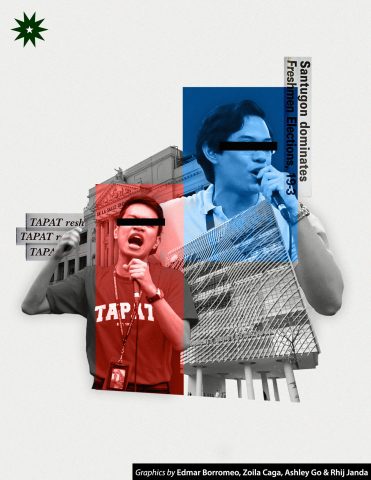
This year’s General Elections (GE) is just around the corner and both Alyansang Tapat sa Lasallista (Tapat) and Santugon sa Tawag ng Panahon (Santugon) have slated who they believe to be the best student leaders the Lasallian community deserves. Tapat’s executive board members and Santugon Secretary-General Aamal Aslam discuss with The LaSallian how exactly they have been molding their candidates and their respective platforms for the upcoming GE.
Finding representatives
Put simply, Tapat is looking for forward-thinking individuals. “What we want [are] progressive leaders who would fight for the rights of the student,” says Executive Secretary Brian Anupol.
For Santugon, meanwhile, Aslam shares, “We believe that a student leader should embody these three brands of leadership—consultative, proactive, and responsive.”
Student-oriented leadership sits at the forefront of the two parties’ screening process. As such, every applicant undergoes extensive training under their respective parties.
The Convention
Every aspiring Tapat candidate is required to go through The Convention, a process where all members of the party ask personal questions, followed by ones about Tapat’s ideologies and principles, USG affairs, and national affairs. The assembly then votes whether or not a prospective candidate is fit to represent Tapat during the elections.
Tapat President Martha Delos Santos believes that it is one’s drive to serve the student body that matters the most. “All skills including speaking and developing programs [and] everything else can be learned…but [a] passion for service isn’t always present in everyone.”
Even if they occasionally encounter prospective candidates with past issues on leadership experience, political stance, and personal problems, among others, Tapat still believes that the focal point of every applicant is their willingness to grow into student leaders guided by party ideologies and principles. “We don’t have anything against them but they’d have to go through all of the training sessions and the Convention process,” Delos Santos states.
Passion and service
In Santugon, the Secretary General taps the potential candidates and reviews them alongside the college generals. Aslam divulges, “We have a screening process to determine if they will be able to uphold the values of the party and represent the student body. We also make sure that these leaders understand the processes in the University, especially the USG.”
Santugon also places more importance over a candidate’s service-orientedness over credentials. “Our main focus is to find people who not only understands the needs of the students and their batch, but who also voices these out,” Aslam says.
Similarly, they apply their progressive ideals to prospects with past issues. Aslam notes, “The focus would be their underlying purpose as to why they want to run for office despite what transpired to them in the past.”
Essential preparations
Each political party aims to be able to field candidates for each vacant position during elections. However, there are cases where no one is chosen or is able to run.
For Tapat, the candidates-to-be are given the liberty to choose which position to run for, according to Anupol. Nonetheless, candidates are not forced to run if no one applies. Robert Munsayac, Tapat vice president for internal affairs, adds, “Mahirap ipilit if ayaw talaga nila [mag-run], ‘cause then…sila rin ‘yung mahihirapan.”
(It’s hard to force them if they really don’t want to run because they will also have a hard time.)
On the other hand, Santugon points out that sometimes this cannot be avoided. “There are times where the people we screen realize that it is not in their best interest to be part of the USG due to other commitments or reasons,” Aslam remarks. This happens for many reasons, but usually occurs for graduating batches where students do not anymore have enough terms left in DLSU or, if they do, focus more on finishing their remaining units than on extracurriculars.
To avoid these circumstances, heavy preparation is needed for a political party.
Career mapping is one of the strategies used by Tapat. Delos Santos describes this as planning what higher posts aspiring candidates might be able to run for in the future by building their experience in the USG.
Apart from training their candidates on public speaking and how to communicate their platforms, in Tapat, aspirants are also trained to hone their ideologies, principles, and the party’s five P’s—progressive, principled, pioneering, personal, and professional leadership.
Santugon, meanwhile, tends to be “very critical” toward the vision and specific plans of actions that their candidates prepare. “We want to ensure that our candidates have a proper understanding of the importance of the position they are running for and the responsibilities it upholds in order for them to be able to represent the students,” tells Aslam.
The shift online
Amid the pandemic and quarantine restrictions, even protocols of the University and student life were affected. The elections are no exception, which is now instantly forced to transition online—a plan that had been built up for a few years now.
With this online setup, there are changes expected of the operations even of political parties. Delos Santos mentions that preparations are a lot different now compared to those for a face-to-face GE. She furthers that campaign materials are harder to produce given physical gathering restrictions. “So the platform making, speech training—all of it is remote,” she comments.
Furthermore, to adjust to the lack of room-to-room campaigning, Tapat plans to hold question-and-answer sessions via Facebook Live.
Despite shifting online, meanwhile, Santugon shares that “there isn’t much of a difference” as compared to how their training is being conducted. That may be, Aslam attests, “We don’t have the traditional room-to-room campaigning, so we also had to adjust our traditional training styles to fit the new adjustments made in the online election code.”A political party’s screening for prospective candidates determines the direction the USG will take if they become elected. Powering through these very challenging terms while far apart, it is a must that Lasallians are represented well by credible leaders.
